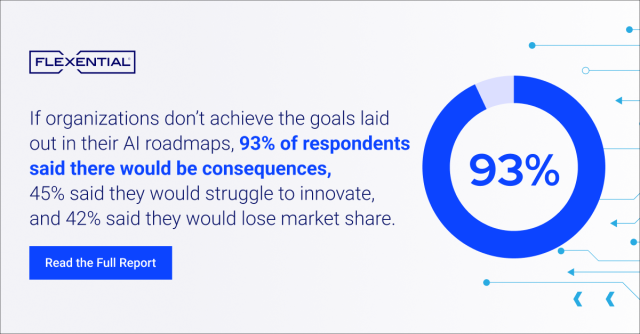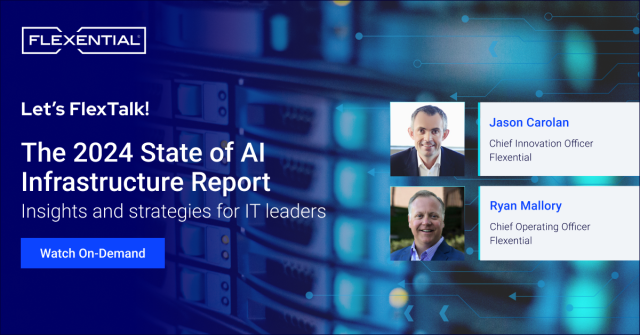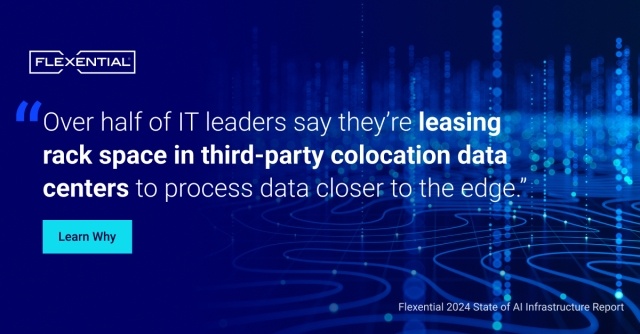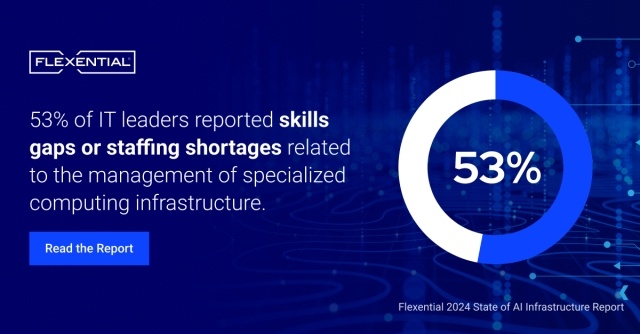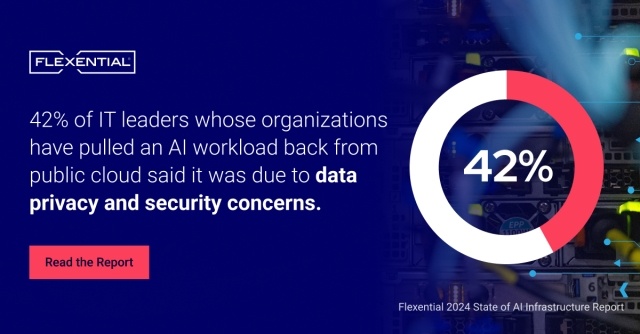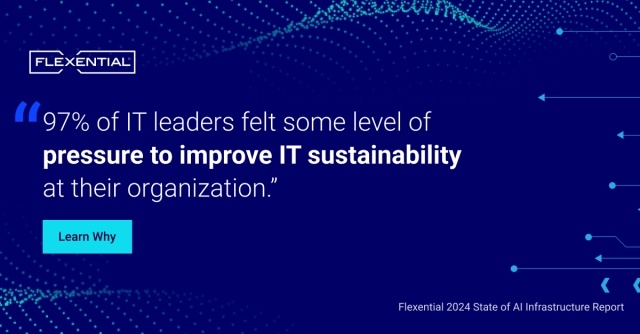Practical strategies for efficient AI integration in business operations
In today’s fast-paced tech landscape, Artificial Intelligence (AI) is reshaping the way businesses operate.

From automating routine tasks to providing deep insights through data analysis, AI is rapidly becoming an essential component for businesses seeking to gain a competitive edge. However, integrating AI into existing IT infrastructures presents a series of challenges that require strategic solutions. Businesses must navigate these hurdles—such as bridging the skills gap, ensuring data security, and optimizing performance—to fully harness AI's transformative potential.
While advancements in AI technology, like Nvidia’s breakthroughs in GPU infrastructure, are helping to smooth the way, businesses still face significant challenges when it comes to practical integration. In fact, we found that 93% of organizations believe there would be consequences if they failed to achieve their AI roadmap goals.
Understanding how to implement AI for tangible benefits and ensuring that the infrastructure supports AI workloads is crucial.
"AI is going to transform business. It’s definitely in the early innings, but the ability to understand the 'So what?' of what AI means to the enterprise is key."
— Ryan Mallory, COO, Flexential
In our recent webinar, Chief Information Officer Jason Carolan and Chief Operating Officer Ryan Mallory explored the future of AI infrastructure data collected from our 2024 State of AI Infrastructure Report, focusing on the challenges of skills gaps, security, and performance.
Read on to learn how their discussion emphasized AI's transformative role in businesses and enterprises' concerns about achieving their AI goals, or click here to watch the full webinar on demand.
Overcoming AI integration challenges in business operations
The shift in data centers to handle AI workloads is moving from server scale to rack scale to pod scale architectures, impacting data center designs and cooling architectures.
AI has the potential to revolutionize operations, but businesses often struggle to understand its full scope. One of the most complex steps in the process is transitioning from traditional server-based systems to advanced AI-ready infrastructures. Whether it's scaling from server to rack or even pod architectures, this evolution demands significant architectural adjustments, including perfecting the cabling and ensuring the stability of mesh networks.
Additionally, cooling architectures for high-performance computing (HPC) pods must be carefully managed. Unlike traditional IT setups, AI workloads generate considerable heat and require specific environmental conditions to operate efficiently.
Utilizing third-party colocation for AI success
63% of IT leaders are using third-party colocation data centers to address AI performance issues, a number predicted to increase due to the flexibility and scalability these data centers provide.
Third-party colocation data centers provide businesses with the flexibility and scalability needed to deploy high-density AI compute nodes. These facilities can support the infrastructure needed for large-scale AI deployments while offering the robust network connectivity required to handle data dispersed across various platforms.
Performance is paramount. Latency or network jitter can negatively impact AI’s real-world applications, making it essential for companies to partner with colocation providers that ensure low-latency, high-bandwidth connections.
Mind the skills gap
There is a significant skills gap in managing AI infrastructure, with 53% of respondents reporting staffing shortages. This highlights the need for both software and hardware skills and the importance of training and development.
A key barrier to efficient AI integration is the industry-wide skills gap. Many companies lack professionals with the technical expertise to manage the complexities of AI workloads. Understanding the transition from software to hardware, the use of emerging technologies like InfiniBand and Ethernet, and the deployment of large-scale AI projects requires specialized skills. Businesses must prioritize investing in workforce training and development to fill this gap and maintain smooth AI operations.
Don’t be AI vulnerable
Security concerns related to AI are prevalent, with nearly all respondents believing that increased AI investment would raise their vulnerability to cyber threats. This underscores the importance of understanding data management and access.
One major challenge is understanding and managing the vast amounts of sensitive data flowing through AI systems, including who has access and how that data is stored, transferred, and utilized. Additionally, the complexity of AI workloads introduces unique cybersecurity risks, such as adversarial attacks, where malicious actors manipulate AI models.
To mitigate these threats, companies need to adopt advanced security protocols, including AI-driven threat detection, regular audits of AI systems, and collaboration with vendors who have proven expertise in AI security. Ultimately, safeguarding AI infrastructure is not just about protecting data but ensuring the integrity and trustworthiness of the AI-driven decisions that power modern business operations.
The pressure is on for IT sustainability
There is increasing pressure to improve IT sustainability, with 47% of respondents feeling more pressure than five years ago. This highlights the importance of focusing on emissions and considering alternative energy sources like nuclear power.
With AI workloads generating enormous amounts of data and requiring powerful compute resources, the strain on energy resources is evident. This intensifies the need for businesses to adopt greener strategies to meet both regulatory requirements and their own corporate social responsibility (CSR) goals. Companies now face the challenge of balancing the performance demands of AI with the need to reduce their carbon footprint.
Forward-thinking businesses are exploring alternative approaches, such as energy-efficient hardware, optimizing cooling systems, and leveraging AI tools to monitor and reduce power usage. Innovations like liquid cooling systems are proving essential for maintaining performance while minimizing environmental impact. Finally, one of the most promising avenues for improving IT sustainability is the adoption of alternative energy sources.
Integration is key
Having an integrated platform offers a solution to the data validation challenges that often arise during AI integration. Data accuracy is critical for AI systems to function correctly, and Flexential provides interconnect products that help businesses federate their data across various locations, whether in branch offices, hyperscalers, or data centers. This ensures that businesses can store and process large datasets effectively, allowing AI to deliver accurate and actionable insights.
In addition to data handling, understanding performance requirements—whether GPU or CPU, deployment location, or network architecture—is essential for successful AI integration. The FlexAnywhere Platform addresses these performance needs by offering the flexibility and capabilities required for AI workloads, empowering businesses to scale AI effectively.
The path to AI-driven innovation
The integration of AI into business operations holds immense potential. From driving innovation to enhancing efficiency, companies that strategically approach AI integration can secure a significant competitive edge. However, this integration requires overcoming challenges related to skills, security, and infrastructure.
AI infrastructure solutions from Flexential provide businesses with the tools and support needed to navigate these obstacles and maximize AI's benefits.
Ready to integrate AI into your business operations and transform your infrastructure for the future? Contact Flexential today to learn how our cutting-edge AI solutions can help your business thrive.




